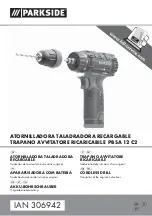
Along with temperature, you must also consider voltage drop when selecting wire sizes. The RPS will
tolerate a voltage drop of 1 V per lead while maintaining the specified programming and measurement
accuracy (see
). Voltage drops of up to 25% of the rated output voltage per lead will be
tolerated with only slightly reduced programming and measurement accuracy. Of course, any voltage
drop in the load leads reduces the maximum voltage available at the load. Subtract the load lead drop
from the rated voltage of the unit to determine the maximum voltage available at the load.
Single Load Connections
1. As shown in the following figure, terminate all load wires with wire terminal lugs securely
attached. DO NOT use unterminated wires for load connections at the power supply.
2. Route the wires through the safety cover before attaching them to the bus bars. Knockouts are
provided on for larger diameter wires. The figure illustrates the recommended hardware for con-
necting wires to the bus bars. You must provide all cabling. Ensure that the wire-mounting hard-
ware does not short the output terminals.
3. When attaching terminal lugs to the bus bars, ensure there is enough room for the safety cover.
Twist or bundle the load wires to reduce lead inductance and noise pickup. The goal is to minimize
the loop area or physical space between the + and - output leads from the bus bars to the load.
4. Attach the safety cover to the rear panel. Note that heavy wiring cables must have some form of
strain relief to prevent bending the safety cover or bus bars.
High Voltage Models - RP795xA and RP796xA
Tightening torque of the output bolts cannot exceed 10.8 Nm (8 lb-ft).
2 Installing the Instrument
70
Keysight RP7900 Series Operating and Service Guide
Summary of Contents for RP7900 Series
Page 1: ...Keysight Regenerative Power System RP7900 Series Operating and Service Guide ...
Page 2: ......
Page 100: ......
Page 262: ......
Page 314: ......
















































